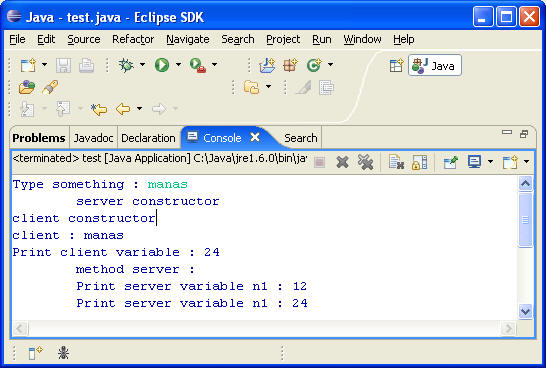class something
{
void method_1() { do something }
void method_1(int i) { do something }
void method_1(String str) { do something }
void method_1(String str, int i) { do something }
}
Concept of overriding : note the signature is changed in overloading
Signature like method_1() remains same.
void method_1() { do something different than base}
Concept overriding and overloading together
- void method_1() { default }
- void method_1(String str) { signature (over-rload, and override print messsage ) }
Overloading a constructor
- class test
{
public test()
{
this.test = "Hello from C#.";
}
public test(String message)
{
this.test = message;
}}
Overriding a constructor
- class test
{
int n1 =10 , n2 =20;
public test()
{
return ( n2/n1);
}
public test(String message)
{
this.test = message;
}}
import java.util.*;
import java.io.*;
//javac clas_name.java
public class test
{
private static int player_no = 12;
public test()
{ System.out.println("This is a constructor with no param");
}
public static void main(String[] args) throws IOException
{
BufferedReader br = new BufferedReader(new InputStreamReader(System.in));
System.out.print("Type something : ");
String str = "";
str = br.readLine();
method_client mc = new method_client();
mc.method_1(str);
}
}
class method_server
{
private int n1 = 12;
public method_server() { System.out.println("\tserver constructor"); }
public void method_1(int n1)
{
System.out.println("\tmethod server : " );
System.out.println("\tPrint server variable n1 : " + this.n1);
this.n1 = n1;
System.out.println("\tPrint server variable n1 : " + this.n1);
}
}
class method_client extends method_server
{
private int n1 = 24;
public method_client(String str){ System.out.println("client constructor"); }
public void method_1(String str)
{
System.out.println("client : " + str);
System.out.println("Print client variable : " + n1);
this.method_1(n1);
}
}

import java.util.*;
import java.io.*;
//javac clas_name.java
public class test
{
private static int player_no = 12;
public test()
{ System.out.println("This is a constructor with no param");
}
public static void main(String[] args) throws IOException
{
BufferedReader br = new BufferedReader(new InputStreamReader(System.in));
System.out.print("Type something : ");
String str = "";
str = br.readLine();
method_client mc = new method_client(str);
method_server dc = new method_server();
mc.method_1();
mc.method_1(30);
mc.method_1(30, str);
}
}
class method_server
{
private int n1 = 12;
public method_server() { System.out.println("\tserver constructor"); }
public void method_1(int n1)
{
System.out.println("\tmethod server : " );
System.out.println("\tPrint server variable n1 : " + this.n1);
this.n1 = n1;
System.out.println("\tPrint server variable n1 : " + this.n1);
}
}
class method_client extends method_server
{
private int n1 = 24;
String str;
public method_client(){ System.out.println("client default constructor");}
public method_client(String str){ System.out.println("client overloaing constructor");
this.str = str;}
public void method_1()
{
System.out.println("default method in client : " + str);
System.out.println("default method in client Print variable : " + n1);
//this.method_1(n1);
}
//overloading a method
public void method_1(int n1)
{//overriding a method
System.out.println("client overloadded method accepts integer : " + n1);
}
//overloading a method
public void method_1(int n1, String str)
{
//overriding a method
System.out.println("client overloadded method accepts integer and string: " + n1 + " "+ str);
}
}